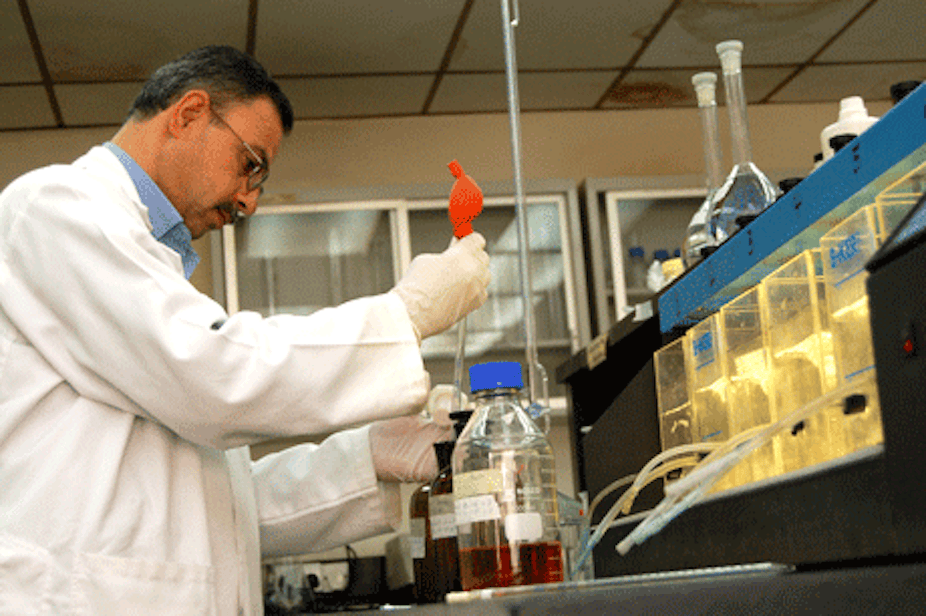A bill designed to stop the transfer of sensitive materials and information would also impede crucial academic research, staff from the University of Sydney have told a senate hearing.
The University of Sydney and Universities Australia say the Defence Trade Controls Bill 2011, which proscribes thousands of materials on the Defence and Strategic Goods List - such as lasers and toxins that could be used in weapons - will have the unintended consequence of inhibiting important research in a wide range of disciplines.
The list has previously controlled only the export of proscribed goods. But the bill seeks to go further by controlling “intangible transfers”, such as measurements of a good’s properties and other uses that are common in research.
Michael Biercuk, an experimental physicist and the Primary Investigator in the Quantum Control Laboratory at the University of Sydney, said that “if you use a system that you can buy commercially from a vendor and you measure some property of it, you write a piece of custom software so you can interface with it - all of those activities are controlled. Even the knowledge of how to measure a property of the system is controlled.
"What that means is that not only can we not publish our results if they’re germaine to some bit of an experiment, we can’t talk about them at conferences either.”
Researchers could apply for permits to use otherwise banned materials, but the cost to university departments, in time and administrative resources, to apply for a permit for every banned intangible transfer would be prohibitive, academics say.
The bill also places restrictions on the transfer of information to foreigners, which Universities Australia says will affect collaborative research projects.
In a written submission, the University of Sydney Vice-Chancellor Michael Spence said: “Universities are typically engaged in a diverse range of activities. These include but are not limited to education in Australia and overseas, basic and applied public good research, consultancy and contract research, publication and research supervision. The setting of inappropriate exemption definitions could result in the legislation being overly restrictive and potentially unworkable.”
Graham Mann, a Professor of Medicine at the university and a researcher at the Westmead Millennium Institute and Melanoma Institute Australia, said that if the bill went ahead in its present form, “there would be a chilling effect on participation by foreigners in our biomedical research, and the probability that important research in human biology and medicine might never be done.
"In the health research sector it has been robustly demonstrated that investment saves lives and increases welfare, so a reduction of investment through increased costs, or non-approval of research, will have a real and potentially quantifiable cost in lives and human welfare.”
He said that research into melanoma, one of Australia’s deadliest cancers, required the use of several instruments - such as mass spectrometers and radiation therapy-related equipment - that might be controlled by the bill.
All research into melanocytes, the precursor of melanoma, involved the use of the cholera toxin, he said. Although knowledge of the toxin was in the public domain and therefore exempt from the list of proscribed materials, modifications to the toxin to achieve other results would require a permit.
Dr Biercuk said that technologies such as radiofrequency and microwave sources, atomic clocks, high-power electronic amplifiers and high-speed electronic control systems pushed “the limits of technical capability in order to access the physical phenomena of interest to researchers” in physics.
But because they could be put to other potentially dangerous uses, they appeared on the list of controlled goods. “Without access to these technologies our research cannot continue.”
“An onerous regulatory regime, requiring allocation of significant resources to monitoring and managing the requirements that would otherwise be devoted to the research will have a significant negative impact. First, as my group has in total only about 10 researchers, we would be overwhelmed by management of the required compliance process.
"Administrative responsibility for compliance would fall exclusively on primary investigators such as myself. Next, top researchers would be reluctant to work in this environment, and high-achieving students may be turned away in order to reduce regulatory burdens.”
Universities Australia, in its submission to the senate hearing, said that although similar legislation was in place in the United States, universities there were “not subject to the degree and extensiveness of controls proposed for Australia in the Defence Trade Control Bill”.
In particular, US universities enjoyed an exclusion for: fundamental research; information in the public domain; “educational instruction in catalog courses”, and; disclosures to “bona fide full-time employees”.
In an explanation of the US law to its academics, Harvard University notes: “Much of the controlled technology that our international students and scholars have access to on campus at Harvard will not require licensing because of the exceptions contained in the regulations for "fundamental research” or “educational information” under the relevant regulations.
“If the on-campus teaching of "basic and applied research” is free from restrictions on publication and involves information that is not subject to any access or dissemination controls, it generally qualifies for the “fundamental research” exemption. The information is deemed to be in the public domain, and no license is necessary for access to this information by foreign nationals.

